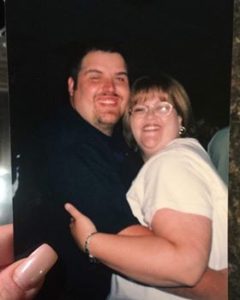Six fatal accidents have occured on Veterans Memorial Highway in the past couple of years. One of the victims was Stacy Dixon.

“Dad was on his way back home,” said Samantha Dixon. “When a car in the oncoming lane veered over in his lane which caused the head on collision.”
The Trinity Conception RCMP detachment did give the family some insight.
“I was speaking to the officer who was on the scene that day a couple of months later,” said Kaitlin Dixon. “Our dads’ vehicle was clocked doing 82.4km/hr and the other vehicle was clocked at 112.7km/hr. Where it happened so quick, no brakes were applied.”
Constable David Bourden is familiar with collisions like Stacy Dixons.
“I never use the word accident,” said Bourden. “An accident can be avoided.”
Bourden is a member of a special team of RCMP officers that investigates fatal collisions.
“Four members of the RCMP attend serious injuries and fatal collision scenes,” said Bourden.
The officers are spread out over Newfoundland and Labrador.
“There’s a station in Gander. There’s one in Clarenville and myself in Holyrood,” said Bourden. “So, every week there’s a different one called to attend a scene.”
When Bourden is called to a collision, he begins by taking photos.The most helpful information that he gathers comes from a box.
“Typically, it’s five seconds worth of data,” said Bourden. “All newer model vehicles have what’s called the event data recorder.”
The data can tell investigators if seatbelts were used, and if someone was speeding.
“On a typical collision, if I see that there’s no steering input, and that the wheel was kept straight but there’s a curve in the road,” said Bourden. “You know there’s obviously something going on inside that vehicle.”
A lot of things can happen to cause a collision, including a medical event or texting and driving.
“It only takes seconds,” said Bourden.
 Pauline Quinlan is aware of the seconds it takes for a collision.
Pauline Quinlan is aware of the seconds it takes for a collision.
“The day of my accident was just like any other day,” said Quinlan. “Just like any good Samaritan we stopped to help an accident in front of us.”
While her husband was pulling off Veterans Memorial Highway to help, he noticed in his rear-view mirror that a five-ton truck was barreling towards them. The driver of the truck was not paying attention to them, which lead to the accident that Quinlan was involved in. This same accident claimed two lives in the vehicle that they were going to help.
“It is a day that will haunt me for every day of my life,” said Quinlan. “The sounds, the sights, and the horror. Those seconds felt like hours.”
Quinlan then decided to take that horror she witnessed and turn it into a petition to change Veterans Memorial Highway.
“The number of fatalities on the stretch was very concerning,” said Quinlan. “I knew someone had to be a voice for those that could no longer speak.”
Quinlan’s petition did become that voice. A voice that went to the Provincial Government.
“It went to the premier and to the Transportation Minister,” said Quinlan. “It got prompt responses.”
On June 28, 2018 the Provincial Government decided to improve safety on Veterans Memorial Highway by funding a $4.8 million-dollar project for improvements to the highway.
Newfoundland and Labrador will give $2.6 million and the Federal Government will contribute $2.2 million through National Regional Projects.
Steve Crocker, the provincial minister of Transportation and Works and Ken McDonald, Member of Parliament for the Avalon were responsible for requesting the money for the changes.
The changes will include rumble strips, passing lanes, and more right-turning ramps on Route 70.
The rumble strips will be added to the shoulders and the center line of the Veterans Memorial highway to alert drivers that they have veered into a danger zone.
The passing lanes will be added to Route 75, between the Trans-Canada Highway and the Bay Roberts Interchange.
The additional ramps will eliminate vehicles from having to cross oncoming traffic to exit the highway.
The provincial government believes that the improvements will mean safer roads, and fewer accidents.
Not everyone agrees that the changes to the highway will make it safer, especially Kaitlyn Dixon.
“Not in the slightest bit. Nobody is going to slow down or stop passing other vehicles for a few rumble strips,” said Dixon. “That highway is nothing, but a death trap and our parents always said that. If it was ever possible, that whole section of the highway should be taken out completely.”
Constable Bourden even has his own concerns about the additional passing lanes on Veterans Memorial Highway.
“I think they’re a good idea but we’re still going to see the high number of collisions that we’re already seeing,” said Bourden. “I don’t think that they’re going to help avoid the collisions.”
Bourden is seeing something worse with the passing lanes.
“Passing lanes tend to allow people to get up to their 120s,” said Bourden. “I expect that the speeds that we’re seeing are actually going to increase because of the passing lanes.”
Minister Crocker wasn’t aware of anyone disagreeing with him on the changes to the Veterans Memorial Highway.
“I haven’t heard any person say that they don’t agree with putting additional lanes on the highway,” said Crocker.
The minister believes that the petition created by Quinlan brought awareness to the issues surround Veterans Memorial Highway.
“That petition really showed the level of public concern,” said Crocker. “It’s long been a priority of the department to find a way to alleviate some of the challenges on that highway.”
The changes to the highway are not the only thing that needs to change with drivers in Newfoundland and Labrador according to Crocker.
“A lot of the challenges that we face on the Veterans and other highways in our province are around driving habits,” said Crocker. “Obviously passing lanes or signage or rumble strips or whatever you may use certainly has to be complemented first and foremost by driving habits.”
Quinlan also agrees that the changes won’t fix everything.
“The changes are not going to make it all go away, I do know that. However, in high traffic times passing lanes will allow people to safely pass other vehicles,” said Quinlan. “More patrols by the RCMP are needed, but most importantly, people need to do their due diligence.”
Even with all the upgrades, the most important message that the Dixon family can pass onto anyone travelling the highway is driver due diligence.
“Slow down, don’t pass anyone for absolutely any reason and keep your eyes on the road. You never know one day from the next, and by taking any chances on that highway, could be your last,” said Kaitlyn Dixon. “Trust us, it’s not a good feeling getting a phone call that someone you love has died due to someone else’s careless acts.”




Be the first to comment